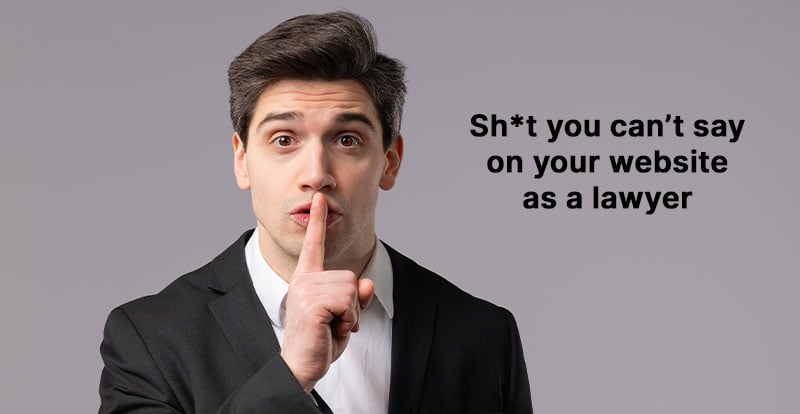Lawyers know how tricky legal language is, and website copy is no different. If you’re a lawyer in Pennsylvania, New Jersey, or Delaware, calling yourself a “specialist” could get you into ethical hot water.
Knowing the “rules” is arguably the most important part of being a lawyer. The law is tricky, especially when it comes to making claims. When a lawyer claims they have a certain “specialty”, that’s a great marketing gimmick, but it could lead to legal issues in certain states. When it comes to practicing law in Pennsylvania, New Jersey, and Delaware, every law firm should bone up on the legal requirements of making “expert” claims.
It’s easy to throw out an ad that says your firm or team are “experts” when it comes to accidents, injuries, or patent law - and that’s a problem these states are starting to address.
Being a true “expert” or “specialist” takes more than just cursory knowledge of an area of law. Just because you’ve tried a few cases doesn’t mean you, or your firm, are suddenly experts in that field. While claims like that might seem innocuous, they can be very misleading to the average consumer, and that’s a problem these laws want to fix.
It’s more than just a legal issue though, it’s a matter of trust.
“Expert” Claims Can Be Misleading and Damage Credibility
Not every lawyer or law firm is known for their credibility, but many try to be. For every ambulance-chaser, an ethical lawyer is trying to give their client the best possible representation. To protect citizens, the above states added a “Rule” that ensures any “expert” or “specialist” claims have to be backed by accreditation or certifications.
While that mostly protects potential clients, it can also protect a lawyer from themselves.
Trust is easy to lose and hard to build. Claiming you’re an expert is easy, but demonstrating that knowledge and expertise certainly isn’t. Studies show that only 22% of American citizens find lawyers trustworthy, so it’s already an uphill battle. Claiming to be an expert without having the knowledge to back it up is just one of the reasons that number is so low. Making ridiculous claims isn’t just a legal issue, it’s a trust issue.
So instead of making shaky claims that could get you into more legal trouble than your clients, pay attention to the language used in your advertising. It matters more than you think.
Why Language Matters in Lawyer and Law Firm Marketing
I know how difficult using the correct language in your marketing can be and regulatory compliance can make or break a business. Saying a product is “eco-friendly” only for it to be made of harmful plastics does more than cause legal trouble, it destroys that company’s credibility. If their advertising is deceitful, what other problems or shortcuts could they be taking?
In some cases, that’s all it takes to lose the consumer's faith. Lawyers are already fighting nasty stereotypes, and grandiose claims that aren’t backed by facts are only going to enforce them. Establishing actual expert knowledge is arguably as important as your diplomas from Law School. Saying you’re a specialist implies more than just a basic familiarity.
Potential clients might hire you or your firm because of those claims, and that’s why they need to be backed up by certifications or accreditations.
Ensuring those claims are valid is an issue that Pennsylvania, New Jersey, and Delaware all take very seriously. By making false claims you do more than risk your credibility, you risk your license to practice law in those states. Knowing those state regulations means avoiding potential punishments from their bar associations.
So what exactly do those laws state about making “expert” or “specialist” claims? Let’s break them down.
Rules and Restrictions in PA, NJ, and DE
Rule 7.4 of Pennsylvania Rules of Professional Conduct
Not only does this rule affect claims made by lawyers it also addresses how lawyers can attain the certifications that make them a “specialist”.
Lawyers can only claim to have a specialty if they are accredited by an organization, and only if that organization meets the requirement of the state’s Supreme Court or the ABA. First, the court has to find that the lawyer’s ads aren’t misrepresenting their claims. Meaning just because they’re accredited for a specific kind of credit card financing fraud does not make them “Finance Law Experts.”
It also asserts that said accreditation has to be available to every lawyer. So whatever course or test was taken needs to be universally offered. That accreditation also needs to be renewed every 5 years, ensuring that it’s consistently checked.
Rule 7.4 of New Jersey Rules of Professional Conduct
Similar to the 7.4 Rule in Pennsylvania, it asserts that no lawyer in New Jersey can claim to be a specialist or practice an area of law unless they meet certain requirements.
That means that the Supreme Court of New Jersey has to approve the organization that granted that title or specialty, and if they didn’t, that needs to be communicated on that lawyer’s advertising. So to avoid having to add an asterisk to your ads or face a hefty fine, avoid using misleading language.
Rule 7.4 of Delaware Rules of Professional Conduct
Once again, the 7.4 Rule for Delaware similarly limits how lawyers can claim “specialties” or state that they’re “specialists”. This rule is slightly different, as it doesn’t limit the accreditation-granted organization’s approval to the state Supreme Court. Instead referring to an “appropriate state authority”.
It does require that any lawyer who has both the approval and accreditation has to feature the name of the granting organization in their ads. That way the general public can do their own due diligence on that “specialist” claim.
Key Commonalities In Rule 7.4 In Different States
In many cases, Rule 7.4 is written exactly the same for one state as it is for another. While there are differences, they all assert that a state-approved organization’s accreditation must be behind any “specialist” claims. Otherwise, this falls under misleading advertising that could get any lawyer in legal trouble.
This is more of an opportunity than a hindrance though. Certifications are advertisements in and of themselves. Instead of trying to cut corners, get an accreditation that will work for you. A potential client wants to know they’re working with an expert, so go to the necessary lengths to ensure you are that expert.
If you’re wondering what exactly qualifies you to be an “expert” in a subject. Well, that’s a bit complicated.
What Counts As A “Specialist” or “Expert”?
Legal language can be difficult to interpret but is ultimately written to make things as plain and straightforward as possible.
There are dozens of ways in which an “expert” is relevant to courts, law, or rulings. In almost every instance, the only way to be considered an “expert” or “qualified specialist” is to have a certification that genuinely says that.
In New Jersey’s case, they have a list on the state court’s website that details how a client can find a certified attorney and how an attorney can become certified. While it might look easy, restrictions include having to be a “member in good standing of the New Jersey Bar for at least five years.”So before making the move to “civil trial law”, an attorney must already be 5 years into their profession. That’s quite strict, but it ensures that any “specialist” or “expert” attorney knows the general practice of law before they dive into a specialty. Doing so establishes credibility and ensures any claims are backed up by already-experienced lawyers.
If a lawyer is making claims that are not from a state-approved entity, that needs to be mentioned in any advertisements. So if a “Patent Attorney” isn’t certified, there needs to be something to the effect of “Not State-Approved for Patent Specialist Claims” or “No aspect of this advertisement has been approved by the Supreme Court of [state].”
When attempting to look like an honest attorney, maybe avoid creating ads that are forced to mention they’re not entirely truthful.
Alternative Language: How To Market Ethically
There’s a way to advertise a focus without having to claim to be a specialist. All it takes is some careful alternative language that ethically mentions certain areas of expertise or knowledge.
While these rules in PA, NJ, and DE are strict, they’re not forcing every lawyer to ruin their ads and it doesn’t prohibit them from mentioning the experience they have. As I already mentioned, the words “expert” and “specialist” are very precise. It denotes a deep level of understanding and implies a level of higher education or certification in that subject. But not every lawyer claims they’re an “expert”, do they?
Detail Relevant Experience Without “Expert” Claims
Just because you aren’t a certified expert doesn’t mean you don’t have a focus. Lawyers with specific experience are not prohibited from mentioning it, just from claiming it makes them an “expert”. Ads can use language like “focused on”, “experienced in”, and “dedicated to [practice area]”. Those phrases can describe expertise without making misleading claims.
Highlight Case Outcomes and Client Testimonials
If you’ve got experience or positive case outcomes, make sure to highlight them. If you have experience relevant to a certain area of the law, there’s no reason to hide it just because it doesn’t make you an official “expert”. The same goes for Social Proof like client testimonials.
First of all, over 80% of people will use the internet to research an attorney. They want to read more than what you have to say about yourself, so offer client testimonials that describe your work from a client’s perspective.
Examples of Compliant Website Copy for Lawyers and Law Firms
Avoid phrases that make false claims or attract the state Supreme Court’s attention.
Here are some examples that can be used:
- “Our Law Firm has extensive experience with personal injury and insurance cases.”
- “I’ve spent years consulting for clients in the food and beverage space.”
- “We have decades of experience in estate planning and probate law.”
- “We’ve helped our libel clients get the settlements they deserve.”
Best Practices for Lawyer Websites in PA, NJ, and DE
To avoid falling into these legal pitfalls, here’s what any lawyer or law firm needs to do.
Checklist for Rule 7.4 Compliance
- Know and review all state-specific certification requirements
- Find a list of state-approved institutions that can grant certifications
- Use any disclaimers when skirting the specifics of these rules, especially in New Jersey
- Avoid guarantees or certifications that aren’t verified or approved
- Hire or collaborate with certified marketing consultants who are familiar with relevant compliance issues
- Review state bar updates to ensure you remain compliant
Don’t wait for the long arm of the law to reprimand you before you fix your content. Not only does it help you avoid hefty fines or potential suspensions, but it also helps you avoid malpractice attorneys who are just as hungry for the next case as you are.




